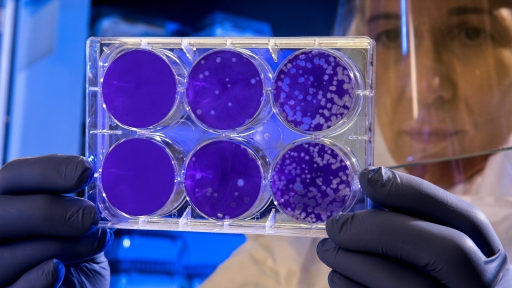Research
Academic women were most affected by the Covid-19 pandemic
Conclusions of the study promoted in the UC after the first confinement
Imahe from CDC available at Unsplash
In order to assess the impact of the pandemic crisis on the working conditions and performance of teachers and researchers, the University of Coimbra promoted - as part of the European project "SUPERA | Supporting the Promotion of Equality in Research and Academia" - the study "Working conditions, perceptions of time use and academic performance in the covid-19 crisis" involving UC teachers and researchers.
According to the results of the survey, conducted between September 10 and 20, 2020, after the first confinement, women academics were the group most affected by the severity of the psychological and emotional effects associated with the confinement, having reported more frequently feelings of anxiety, sadness, concern about the professional future and perception of lack of control over the situation.
According to the coordinator of the study, Mónica Lopes, researcher at CES-UC, "the COVID-19 pandemic led to the adoption of contingency measures (for example, the transition to remote work/teaching in universities and the closure of schools and social facilities) which had strong implications in the organisation and conditions of academic work (for example, transition to online classes, academics with children began to combine teaching and scientific activity with child care, researchers had to reformulate and adapt research plans).
This study has shown that the new conditions for carrying out teaching and research work have had a differentiated impact on female and male academics, making visible or accentuating pre-existing inequalities in terms of working conditions, possibilities of reconciling work and family, division of academic work and scientific performance. The results point not only to the greater severity of the effects of the pandemic crisis on women academics, but also to the particularly disadvantaged situation of male and female academics with dependent young children and younger teachers/researchers with precarious contracts to correspond to the strong demands and high standards of performance of the profession during the pandemic. On the other hand, the study highlights the critical role of institutional support (from colleagues, technical services, faculty/department/ R&D unit directorates and rectory) in buffering the negative effects of confinement on academic performance."
Regarding the change in the use of personal and domestic/family time associated with the first confinement, the activities that were most impacted were housework and care and monitoring of children and young people, to which more than 2/3 of the respondents started to devote more time. Women, especially those with children or dependent adults, were the most affected by the overload of domestic and family work and the reduction of leisure time.
With regard to the perception of the influence of covid-19 on the use of academic time, it was also women and people with children up to 12 years old who revealed a greater influence of the pandemic on the allocation of time to professional work. 68% of women and 67% of people with children up to the age of 12 stated that covid-19 influenced the allocation of time to work a lot or very much, compared to 54% of men and 48% of people without children stating this influence.
The study also provides important information on the extent to which the distinctive burdens imposed by confinement on younger women with young children impacted on scientific output. The results show a reduction in scientific outputs during confinement, but only in the case of academic mothers. Male academics, during confinement, focused more on the most valued scientific output, such as articles, books and book chapters, while women's investment was more diversified and often directed towards the pedagogical side. It should also be noted that 4 out of 10 of the people surveyed stated that they were dissatisfied with their academic/scientific performance, in terms of results, during confinement.
Another of the conclusions of this study was the importance attributed by respondents to institutional support to mitigate the negative effects of confinement in the conditions of remote work and academic performance.
This study, which included a sample of 281 teachers and researchers at the UC, was conducted as part of the SUPERA project - Supporting the Promotion of Equality in Research and Academia, coordinated in Portugal by the Centre for Social Studies (CES) of the University of Coimbra. This project, of which the University of Coimbra is the only Portuguese university to take part, aims to combat inequalities between women and men in the academic world by supporting the implementation of action plans for gender equality in six European entities of the scientific system.
The Plan for Equality, Equity and Diversity of the University of Coimbra is now in its final stages of preparation and will soon be available.
Source: SUPERA/Universidade de Coimbra


